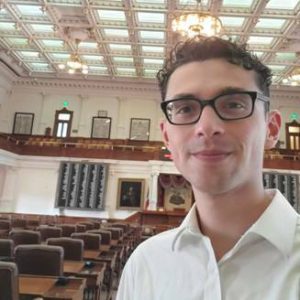
Moses Hetfield, Teach For America RGV ’21 Corps, teaches AP U.S. government and AP economics to 12th-graders at IDEA College Preparatory San Juan.
What motivated you to apply to join Teach For America and choose to teach in the Rio Grande Valley?
I have wanted to become a teacher since I started college, but my university did not have a teaching program for undergraduates. I love working with kids, and I believe that teachers have a huge impact on the individual lives that we touch, and that impact is carried over into the even larger impact future generations will make in society.
Teach For America seemed like a great way for me to enter the profession of teaching. All the teachers I talked to said (quite accurately) that the first year of teaching would be extremely difficult. Being part of a learning community of other new teachers who share my passion for educational equity has allowed me to grow as a teacher and provided me with a support system when things don’t go according to plan.
Unlike many Teach For America corps members here, I didn’t specifically choose to teach in the Valley — I was lucky enough to have the Valley choose me. I grew up on the East Coast and went to college in California, so all I knew about the RGV was from a single conversation with a friend in my freshman dorm who was from McAllen. I was nervous about being invited to teach so far from home, but everyone has been so welcoming that I’ve felt right at home. I’ve been very happy here, and I’m excited to continue working at IDEA San Juan after my TFA experience officially ends this summer!
What has been one of the most surprising things you’ve come to learn about education during your time as a classroom leader?
I used to assume that good teaching was about what individual teachers do in their own classrooms, but I’ve come to learn that collaboration between teachers, administrators, operations staff, and parents is key to ensuring success for all students. My first year of teaching was far easier and far more successful because of the support I received from my manager and colleagues. Collaborative problem-solving with other teachers allows us to effectively address academic, behavioral, and attendance issues, creating a learning environment where students know what is expected of them.
While close collaboration is easier at a small school like mine, where all of the 12th-grade teachers could fit in one car together, I believe the general principle applies to education more broadly. Schools are complex ecosystems where each staff member affects the classroom environment across the building.
If you could change one thing for your students, what would it be?
I have heard from friends who teach at other schools who often deal with bureaucracy, apathy, prejudice, and low expectations when advocating for their students. I admire these friends of mine, and I know that they are greatly impacting their students, but from a systems perspective, this type of upstream fight for change is unsustainable. In order to change outcomes for our students, we need every school to have skilled school leaders who can inspire staff to work together towards a shared goal, recruit and retain teachers who care, and help them grow into the best educators they can be.
What lessons are you learning now that will help you continue to work toward educational equity in the future?
One of the things I love about my job is that I am constantly learning new things. One big lesson has been that students learn more deeply and are more engaged when the teacher does less of the talking. Another has been the power of small actions, from warmly greeting students as they enter the classroom to making positive calls home to parents.
Can you share an anecdote or personal experience from your classroom or school?
One of the highlights of teaching for me is seeing the creativity of my students when they do projects for my class, whether they are arguing as lawyers before the Supreme Court, writing/performing rap battles between the Federalists and Anti-Federalists, or filming campaign advertisements for fictional candidates. One of my favorites was when a class period of mine worked together to create a three-part puppet show about the three branches of government, featuring a song parody about the Supreme Court, an original rap about Congress, and a sketch comedy routine about the powers of the president. It was clever, it was hilarious, and it successfully synthesized so much course content into one performance.



